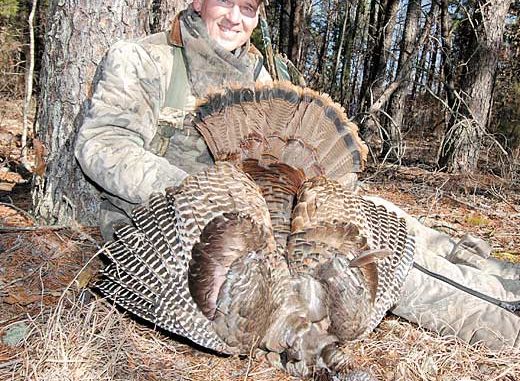
The 2009 winter turkey season may be the last one in the Tar Heel state.
Basil Watts heard a turkey gobbler calling in the distance. It was early in the morning in a location where he had seen a gobbler the afternoon before. Setting up hastily to face the bird, he leaned his back against a tree and began calling to the gobbler.
“It was cold and windy,” he said. “It wasn’t anything like hunting in the spring. There was ice on the ground and frost on the leaves. But the turkey was almost as vocal as any spring gobbler. The difference was that he was making deep yelps, not gobbles.”
Watts was hunting at Hyco Game Land in Person County. He and a couple of partners had been drawn as a part for three of six lottery permit hunts held for winter turkey hunting at Hyco.
“We had put in for the game land draw as a party and were fortunate to get to hunt,” Watts said. “The winter season doesn’t apply in southeastern North Carolina where we live so we had to drive quite a distance for the hunt.”
Watts and David Franklin are hardcore turkey hunters. They had also applied for hunts at the R. Wayne Bailey-Caswell and Mayo game lands. When the chance drawing allowed them to try for a winter bird at Hyco Game Land, they headed to Person County for the special hunt. Franklin wanted the chance to take a hen turkey for making a mount or perhaps a decoy for spring gobbler hunting. Watts was along for the adventure.
“I didn’t worry about taking one of my two-bird North Carolina bag limit in winter,” Watts said. “I hunt in South Carolina mostly, and the bag limit there is five gobblers. I wasn’t going to run out of South Carolina tags come spring.”
Watts didn’t hear anything the first morning of the hunt. The hunters had scouted the game land the day before the season opened, finding tracks in the soft red clay soil along the shoreline of the lake, which was very low because of a drought. After hunting the first morning, he was leaving the woods when he received a call on his cell phone.
“When I answered the phone, a big gobbler flew up from the woods and over my head,” he said. “I don’t know if he was coming to my calls or if he just happened to be there. It’s hard to tell where they are when they don’t gobble coming in to a call. That’s the biggest difference between hunting in winter and spring.”
By hunting the area where the gobbler had been the day before, Watts hoped to have a closer encounter. Once he heard the gobbler and set up, he called with a custom slate call. The gobbler answered every time he yelped with the slate. But the bird was yelping, not gobbling.
“When he got really close, I started scratching in the leaves with my hand,” Watts said. “He yelped just as hard to the scratching as he did to my calling.”
The gobbler was very close when Watts fired. However, there was too much brush in the way and the turkey escaped.
“There was a tangle of vines and twigs I didn’t see because I was focused on the gobbler,” he said. “But it was an exciting hunt and as much fun as a spring hunt, even if the turkey got away. The weather was just a whole lot colder.”
Franklin hunted the opposite side of the lake from Watts the first afternoon. After finding lots of droppings and scratchings indicating a hen roost, he decided to set up a blind in the area. But on the way to set up the blind, a flock of hens suddenly appeared on a peninsula.
The eight hens flew across the lake from the area where he was heading to set up the blind. It was cold and windy and he knew the blind would help keep him warm, as well as safe from the sharp eyes of a turkey if one approached silently. He also knew he might have no vocal warning from incoming turkeys to keep him focused and still. So he set up the blind and called, hoping the hens would return to the roost. But they did not.
“I scouted the area where the hen flock landed and hunted there the next morning,” Franklin said. “I set up and had been sitting a while using a mouth call to make a series of a few yelps. A hen turkey yelped behind me. I moved around the tree to face her and got ready to shoot. Although I saw turkey and she was in range, I but didn’t have a good shot. Her head kept bobbing and weaving through the cover. Eventually, she spotted me and flew up into a tree, out of range. She checked me out until I couldn’t remain still any longer. When she saw me moving she flew off.”
Franklin said he wasn’t anticipating hearing lots of turkeys, but expected finding some on a roost so he could scatter them. He said winter turkeys are very responsive to calls, but he didn’t hear any gobblers.
“I hear gobbling sometimes in the winter,” he said. “I expect the weather played a role in the turkeys being so quiet during our 2008 Hyco hunt. It was windy and cold with ice on the lake and on the ground in the mornings.”
Franklin said he will try again this winter by applying for another game lands permit hunt.
“Shooting one in winter would have allowed me only one more turkey in the spring,” he said. “But it’s something different to try to do. I also hunt some in South Carolina, so I could have kept hunting in that state after taking my two North Carolina birds.”
This January’s season may be his last opportunity to take a hen in North Carolina, unless it’s a bearded hen taken in spring, although the winter season could also be reinstated if the criteria for holding are met again in the future and hunters show an interest in reopening the winter season at that time.
A proposal by the N.C. Wildlife Resources Commission would end the winter either-sex season. Franklin said if the winter season no longer meets the criteria for continuing it, he was in favor of ending the winter season.
Watts was surprised to hear of the proposal to end the winter season. He said it was so underutilized it was almost non-existent.
“There aren’t enough turkeys killed to amount to anything,” Watts said. “I don’t see that it could hurt the turkey population.
“If you hunt the winter season, you have the woods all to yourself. If they made it a gobbler-only season like the spring season, it wouldn’t make any difference in the harvest or the population because you can still only take two birds per year and hens would be protected.”




Be the first to comment